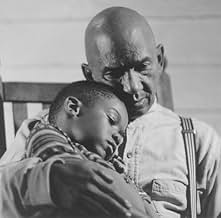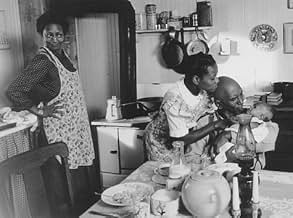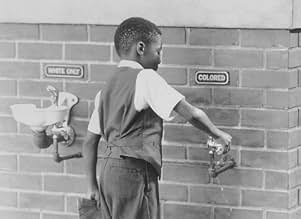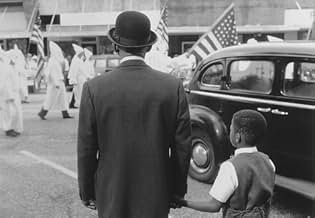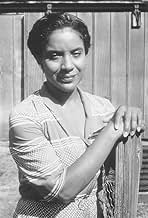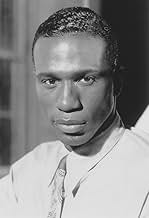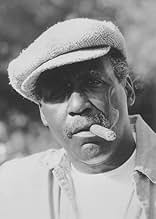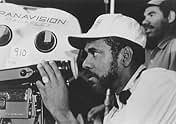Füge eine Handlung in deiner Sprache hinzuA narrator tells the story of his childhood years in a tightly knit Afro-American community in the deep south under racial segregation.A narrator tells the story of his childhood years in a tightly knit Afro-American community in the deep south under racial segregation.A narrator tells the story of his childhood years in a tightly knit Afro-American community in the deep south under racial segregation.
- Regie
- Drehbuch
- Hauptbesetzung
- Auszeichnungen
- 3 Gewinne & 2 Nominierungen insgesamt
Salli Richardson-Whitfield
- Miss Alice
- (as Salli Richardson)
Ray J
- Cliff (12 Yrs.)
- (as Willis Norwood Jr.)
Frank Hoyt Taylor
- Straw Boss
- (as Frank Taylor)
Empfohlene Bewertungen
"Once Upon a Time... When We Were Colored" is a nice movie. It's tame, calm, and largely uneventful which makes it nothing more than nice. It's about a Black boy's growing up in the South during the Jim Crow era. It's devoid of any real drama considering we're talking about Black folks trying to survive in the South. The movie has some fine actors in it and I believe they did the best they could with the script. Unfortunately, it was a weak script. I think this movie would've done well as a book, but not all books need to be made into movies.
I am very fond of this film, and I have had the opportunity to hear Clifton Taulbert speak in person. I think the point of the film is that while black people who had to endure much during the 100 years that followed the civil war they still managed to create many supportive communities. In addition there were good role models for young people like Clifton Taulbert. As a response to the undeniable oppression, the black community of Glen Allen, Mississippi, bonded and supported one another. It did, in fact, mean that their lives were made less miserable. They experienced joy and fellowship as well as oppression. They refused to take on victim-hood as an identity. At the same time, there was a vigorous challenge to the status quo. I don't think the movie is too sentimental, or inaccurate.
I have shown this movie to students many times and it has never failed to move them to a real concern for the condition of minorities. It reaches these students on an emotional level, and it gets them interested in learning more about the issue of human rights. That is no small feat.
I have shown this movie to students many times and it has never failed to move them to a real concern for the condition of minorities. It reaches these students on an emotional level, and it gets them interested in learning more about the issue of human rights. That is no small feat.
It just touchdown little things that happened in the era didn't really stick to any things. And when it came to the very ending they could have delved into that a little more but they didn't. One thing that irritates me the most is that the lead character has a pretty terrible mother and it wasn't acknowledged in any way if this is a true story I wonder how he feels about the end result which sadly he probably like because it was an All-Star cast
I kept waiting for the bad moments to happen, as so often they do in these reminiscent movies of growing up in the south, yet no real drama occurred. These were moments pieced together, and if that was the intent--it worked. True, a child's reflection of childhood would be pieces of memory chained loosely together, impressions of events, people, and times. However, when the movie ended I thought, "That's it?" There were fine performances; however, the plot seemed to soft-step around the real issues, such as the Jim Crow laws, segregated schooling, subservient wages, and escaping to the north to avoid the subjugation. We got breadth, when depth might have made a much more interesting plot line.
"Once Upon a Time When We Were Colored" (1996): Set in the deep American South, over the years 1946-1962, and told as biography, this is the story of one boy's memories of being raised in the Cotton & Bible Belt. He's poor, his family is in pieces, he's Black, he's surrounded by the KKK
and yet, this is a soft, even soft-focus look back at the people who DID provide community family, did not dwell on their poverty nor make their race the focal point of a normal day. We are so accustomed to angry, relentlessly violent films about the racial divides, this film could easily be taken as a Hallmark Card presentation
but SOMETHING about it tells me otherwise. Yes, problems are depicted, and yes, the times they were a-changin', but not as fast or dramatically as we've come to accept from the quick flip of a few pages in history class. I LIKE the pace of this film. It's slow, warm, often funny, occasionally sugary, sometimes sad or maddening, but for the most part it's a nostalgic look back at the GOOD parts of black author's childhood.
Wusstest du schon
- WissenswertesWhen Melvin tells the group of elders all the benefits of living up North, he says that Colored men even drive buses. Preacher Hurn replies "Shut yo' mouth!" Isaac Hayes wrote the theme to Shaft (1971), and Richard Roundtree played the titular character.
- SoundtracksMaybe Tomorrow
Written and Performed by Lionel Cole
Top-Auswahl
Melde dich zum Bewerten an und greife auf die Watchlist für personalisierte Empfehlungen zu.
- How long is Once Upon a Time... When We Were Colored?Powered by Alexa
Details
Box Office
- Bruttoertrag in den USA und Kanada
- 2.291.255 $
- Eröffnungswochenende in den USA und in Kanada
- 75.675 $
- 28. Jan. 1996
- Weltweiter Bruttoertrag
- 2.291.255 $
Zu dieser Seite beitragen
Bearbeitung vorschlagen oder fehlenden Inhalt hinzufügen


